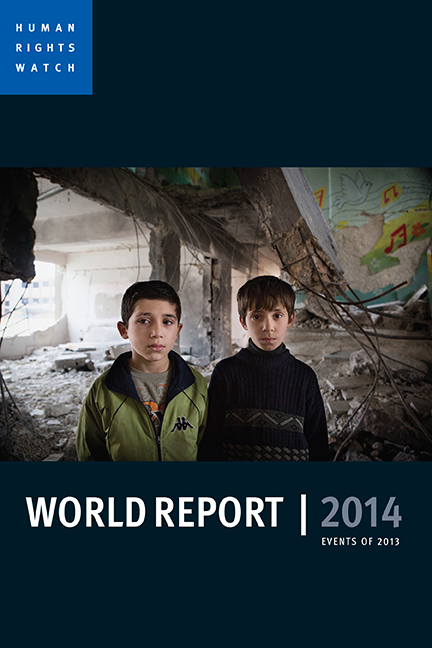Book contents
- Frontmatter
- Dedication
- HUMAN RIGHTS WATCH
- Table of Contents
- Foreword
- Rights Struggles of 2013: Stopping Mass Atrocities, Majority Bullying, and Abusive Counterterrorism
- The Human Rights Case for Drug Reform How Drug Criminalization Destroys Lives, Feeds Abuses, and Subverts the Rule of Law
- Putting Development to Rights: Integrating Rights into a Post-2015 Agenda
- The Right Whose Time Has Come (Again) Privacy in the Age of Surveillance
- Photo Essays
- AFRICA
- AMERICAS
- ASIA
- EUROPE AND CENTRAL ASIA
- MIDDLE EAST AND NORTH AFRICA
- UNITED STATES AND CANADA
- 2013 HUMAN RIGHTS WATCH PUBLICATIONS
- Acknowledgments
- Frontmatter
- Dedication
- HUMAN RIGHTS WATCH
- Table of Contents
- Foreword
- Rights Struggles of 2013: Stopping Mass Atrocities, Majority Bullying, and Abusive Counterterrorism
- The Human Rights Case for Drug Reform How Drug Criminalization Destroys Lives, Feeds Abuses, and Subverts the Rule of Law
- Putting Development to Rights: Integrating Rights into a Post-2015 Agenda
- The Right Whose Time Has Come (Again) Privacy in the Age of Surveillance
- Photo Essays
- AFRICA
- AMERICAS
- ASIA
- EUROPE AND CENTRAL ASIA
- MIDDLE EAST AND NORTH AFRICA
- UNITED STATES AND CANADA
- 2013 HUMAN RIGHTS WATCH PUBLICATIONS
- Acknowledgments
Summary
Longstanding deficiencies within the judicial system and security sector, as well as insufficient efforts to address official corruption, continue to undermine development and human rights in Liberia.
Ten years after the signing of a peace accord that ended over a decade of armed conflict, Liberians and the country's key international partners increased pressure on President Ellen Johnson Sirleaf's government to expedite reforms.
While President Sirleaf dismissed a number of high-ranking government officials accused of corruption, her government, as in past years, failed to pursue investigations into the alleged crimes, thereby undermining accountability efforts.
Police Conduct
Widespread police indiscipline and corruption continue to compromise equal and impartial justice and the establishment of the rule of law. Liberian police officers routinely demand bribes and participate in extortion schemes. Members of two armed units—the Emergency Response Unit and the Police Support Unit—regularly engage in armed robbery and other criminal acts during patrols.
Police officers operate with serious logistics shortages, including a lack of vehicles, fuel, uniforms, and basic tools to carry out their duties.
The police made some effort to address the abuse, notably through the Professional Standards Division (PSD), which receives and processes public and internal complaints against officers. From January to June, the PSD received 299 cases, investigated 96, and acted upon 80. Despite this progress, many Liberians are still unaware of the unit and its work.
Access to Justice
Persistent weaknesses in the judiciary undermined access to justice and due process. Prolonged pretrial detention is prevalent; fair and speedy trials are rare. The judiciary is able to conclude only a small number of cases every year. Poor management of the judiciary and corrupt practices by judges, jurors, ministry administrators, and others also severely undermine the dispensation of justice.
An estimated 80 percent of detainees are subjected to extended pretrial detention as a result of the understaffing of the courts, inadequate funding for the judiciary, and lack of coordination between the police and the courts. But greater attention by both the government and donors led to some improvements in this sector. Liberian officials, with external support, created a regional hub system, which is intended to decentralize the security and justice sectors by placing armed police officers, immigration units, and judges in five regional centers outside of Monrovia. The first hub opened in Gbarnga, the capital city of Bong County, in 2013.
- Type
- Chapter
- Information
- World Report 2014Events of 2013, pp. 136 - 142Publisher: Bristol University PressPrint publication year: 2014

